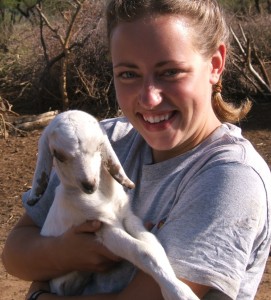Sara McCarthy
MSc. Student
Contact Information
Department of Biology
Concordia University (Loyola Campus)
7141 Sherbrooke St. W. H4B 1R6
Montreal, QC, Canada
Office: SP301.16
Lab: SP434
(514) 848-2424 (ext. 4021)
Education
2008-2010: Biology Graduate Student at Concordia University
2003-2007: Honours BSc. Zoology at University of Guelph
My Project
Habitat factors at multiple spatial scales and their connection with Newfoundland’s caribou population decline
Background
Identifying factors that influence population dynamics is one of the main goals of ecology. With the recent population decline of Newfoundland’s woodland caribou, an understanding of the coarse-scale habitat mechanisms behind population dynamics (survival and recruitment rates) has become vital; so as to recommend effective management measures that may alleviate the decline. It is well acknowledged that alteration of habitats by human activity is a great threat to the persistence of Rangifer throughout their ranges. However, few studies have looked at human generated range alterations (e.g. logging, road construction, land conversion) and their impact on Newfoundland caribou herd survival and reproduction.
Field Work
The study will encompass the 12 herds that span across Newfoundland represented by 350 adult female caribou that have been fitted with GPS or satellite collars since 2006. The 2009 summer field season will involve habitat classification and map verification, as well as quantifying features between habitat types; such as insect abundance, resource availability and climatic variables.
Objectives
• To identify and quantify at the coarse-scale (yearly range) the key habitat factors that influence the vital rates of caribou herds across the island. Factors to be examined include range composition (habitat type percentages, forest age), edge effects, road densities, patch size and connectivity.
• At a finer-scale, measure specific variables within the significant key habitat factors from #1 that may be contributing to their effect on population dynamics. Variables that may be correlated include resources, predation, climate, disturbance and insect harassment.
• Examine how these relationships differ between Newfoundland’s eco-regions.
• Examine how caribou habitat preference differs between Newfoundland’s eco-regions.
Publications
S.C. McCarthy, R.B. Weladji, C. Doucet & P. Saunders (2011) Woodland caribou calf recruitment in relation to calving/post-calving landscape composition. Rangifer 31: 35-47
S. McCarthy, R.B. Weladji, , C. Doucet, P. Saunders. (2009). Influence of human mediated disturbacne on woodland caribou (Rangifer tarandus caribou) recruitment. 34e congrès annuel pour le Société Québecoise pour l’Etude Biologique du Comportement, 13-15 Novembre, 2009, Trois-Rivières, Québec (Abstract, page 53; poster)
S. McCarthy, C. Doucet, P. Saunders & R.B. Weladji (2008) Coarse-scale habitat factors influence caribou population dynamics (Poster Presentation). 12th North America Caribou Workshop – November 3-6, 2008, Happy Valley-Goose Bay, Labrador, NL (Page 7).